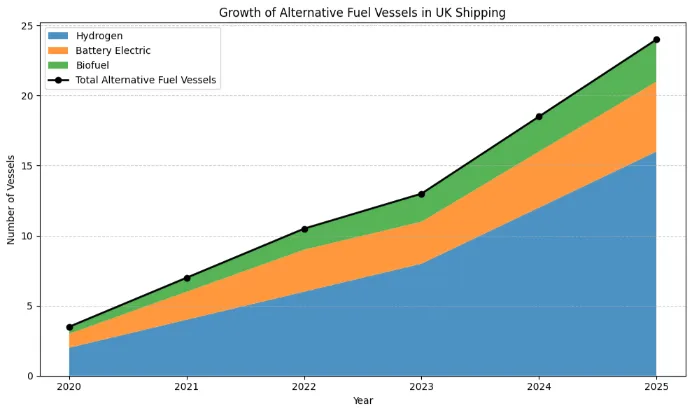
Hydrogen Fuels UK and Shipping: Maritime Innovation for a Greener Industry
Hydrogen fuels in the UK are leading a significant change in the maritime industry. They are pushing for greener, zero-emission shipping options. As the UK works harder to meet its net-zero goals, hydrogen-powered ships and necessary infrastructure are becoming crucial for reducing carbon emissions in maritime transport, which currently makes up a large portion of global greenhouse gas emissions.
The Urgency of Maritime Decarbonisation and Hydrogen’s Role
Shipping accounts for about 2.5% of global CO2 emissions. The UK government was the first in the world to include international shipping emissions in its domestic carbon budget. The International Maritime Organization (IMO) aims to cut these emissions by 50% by 2050. Hydrogen fuels in the UK offer a reliable path to achieve these ambitious goals by allowing zero-emission propulsion systems and cleaner port operations.
Pioneering Hydrogen-Powered Vessels in the UK
Several innovative projects in the UK are showing hydrogen’s potential for maritime use:
RESTORE Project
This £4.6 million initiative led by AceOn Group and partners retrofitted Newcastle University’s research vessel, the Princess Royal, with a hybrid hydrogen-battery propulsion system. This upgrade enables the ship to operate at zero to low emissions, especially at slow speeds, cutting emissions by up to 60%. This marks an important step in zero-emission maritime technology.
Transship II Project
Funded by the Department for Transport and Innovate UK, this £5.5 million project is retrofitting the Prince Madog research vessel with a hydrogen-electric hybrid propulsion system. This setup allows for zero-emission operation during short trips and daily teaching excursions, demonstrating practical hydrogen applications in maritime research and education.
Hydrogen Combustion Engines
In 2025, a UK cargo ship operated by Carisbrooke Shipping will test a hydrogen combustion auxiliary engine powered by hydrogen from biomass. This government-supported initiative aims to confirm the use of hydrogen combustion for ocean-going vessels and expand the technology for wider application.
Infrastructure Development: Hydrogen Refuelling and Supply Chains
Building hydrogen infrastructure is crucial for the use of hydrogen in maritime transport. The UK is investing in green hydrogen production and refuelling facilities to support ships and port operations. For example, ports around the world, including some in Europe, are setting up green hydrogen plants and refuelling stations, creating a model for UK ports to emulate.
Benefits of Hydrogen Fuels UK in Maritime Transport
Zero Emissions
Hydrogen fuel cells release only water vapor, removing greenhouse gases and pollutants from ship exhausts.
Retrofitting Existing Fleets
Hybrid hydrogen-battery systems can be added to existing ships, providing a cost-effective way to transition without needing to discard vessels.
Supporting Offshore Renewable Energy
Hydrogen-powered vessels are perfect for servicing offshore wind farms, connecting maritime transport with the UK’s renewable energy goals.
Energy Security
Producing hydrogen domestically lessens dependence on fossil fuels and unstable global oil markets.
Challenges and Solutions
- Storage and Safety: Hydrogen’s low energy density and flammability need advanced storage solutions and strict safety standards. UK projects are leading the way in safe hydrogen storage and handling practices.
- Cost and Scale: Initial investments in hydrogen propulsion and infrastructure can be high, but government grants and collaborative efforts are lowering costs.
- Regulatory Framework: The UK is actively creating regulations and standards to support hydrogen use in maritime applications, ensuring safety and efficiency.
Future Outlook: The UK Leading Maritime Hydrogen Innovation
With ongoing government support, including funding from the Clean Maritime Demonstration Competition and Innovate UK, the UK is in a strong position to lead in global maritime hydrogen adoption. The offshore support sector alone is expected to be worth £26 billion by 2050, needing about 1,200 vessels to support renewable energy infrastructure, many of which will likely use hydrogen technologies.
Hydrogen fuels UK are not only changing how ships are powered but also promoting cleaner port operations and logistics. This aligns the maritime industry with the UK’s broader climate and economic goals.
Conclusion
Hydrogen fuels UK are fostering maritime innovation by enabling zero-emission vessels, retrofitting existing fleets, and building essential hydrogen infrastructure. These progressions place the UK at the forefront of the global green shipping movement, supporting environmental goals, economic growth, and energy security. As hydrogen technology develops and expands, it holds the potential to transform the maritime industry into a sustainable foundation of the UK’s net-zero future.